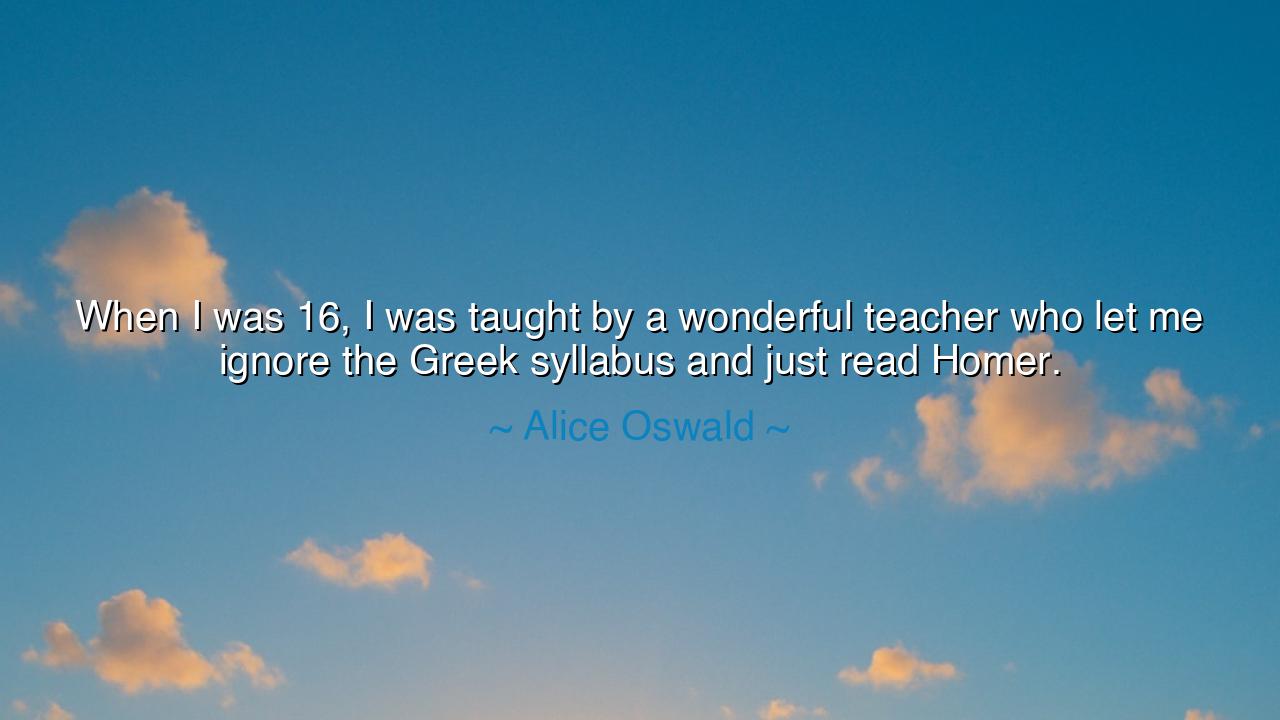
When I was 16, I was taught by a wonderful teacher who let me
When I was 16, I was taught by a wonderful teacher who let me ignore the Greek syllabus and just read Homer.






Hear the words of Alice Oswald, poet and seer of our age, who said: “When I was 16, I was taught by a wonderful teacher who let me ignore the Greek syllabus and just read Homer.” Within this gentle remembrance lies a truth as powerful as the epic lines of the poet she names: that true learning is not always in the following of prescribed paths, but in the freedom to encounter wisdom in its raw, living form. For there are moments in youth when a single act of permission, a single turning away from the rigid order of rules, opens the soul to a treasure that lasts a lifetime.
The heart of this saying lies in the teacher’s vision. Most cling to the syllabus, that set of boundaries drawn by authority, believing that safety is found in structure. But the wise teacher knows that structure is only a frame, not the essence. To allow a student to step beyond the frame, to drink directly from the spring instead of sipping from the measured cup, is the mark of true guidance. In giving young Oswald the freedom to dwell with Homer, her teacher did not rob her of discipline, but granted her access to the fire of inspiration, a fire that would one day forge her voice as a poet.
Homer himself, ancient and eternal, is the fountain of Western imagination. In his verses, warriors clash, gods descend, and the fragile beauty of human life shines through the dust of battle. To encounter him at sixteen, unmediated by rigid lessons, is to stand face to face with the origins of epic, to be seized not by analysis but by awe. Oswald’s later works—steeped in myth, river, and voice—bear witness to that first encounter. The gift of the teacher was not instruction in grammar, but initiation into wonder.
History gives us parallels. Recall how Alexander the Great, as a boy, was entrusted to Aristotle. His syllabus could have been the endless repetition of rules and logic. Yet Aristotle placed Homer’s Iliad in Alexander’s hands, and the boy slept with it beneath his pillow as a soldier might with his sword. From those pages, Alexander drew not only knowledge of verse, but a vision of heroism, destiny, and glory that shaped his conquests. The text, read passionately, was more formative than any rigid lesson plan. It is ever the same: the living encounter with greatness outweighs the mechanical study of parts.
This story also reminds us that at certain moments in life, it is the freedom to follow desire that leads to lasting knowledge. A young soul may not thrive when forced to dissect rules, but may blossom when allowed to pursue what stirs the heart. Discipline matters, but inspiration transforms. Oswald’s quote is thus a hymn to the balance of teaching: guidance must not smother curiosity, nor should order extinguish the flame of passion.
The lesson is clear: do not measure learning only by tests, timetables, and syllabi. Instead, honor the deep hunger of the soul for direct contact with beauty, wisdom, and greatness. Seek the texts, the mentors, the works of art that call to you, even if they lie outside the prescribed path. And if you are a teacher, dare to see beyond the plan, and when the moment comes, allow your student to wander into freedom, for it is there that greatness is often born.
Practical steps may follow: take time to read what moves you, not only what is required. Let curiosity guide your hand to books, music, or traditions that awaken wonder. If you are young, remember that a single work of genius, read deeply and passionately, can shape your whole being more than a hundred assignments skimmed half-heartedly. If you are older, become like Oswald’s teacher, granting others the space to encounter greatness in their own way.
Remember always: the syllabus teaches order, but Homer teaches eternity. To read him at sixteen, under the blessing of a wise teacher, is to discover not only poetry but the heartbeat of the human story. And to live by this wisdom is to know that true education is not the memorization of rules, but the awakening of the soul to what is eternal.






AAdministratorAdministrator
Welcome, honored guests. Please leave a comment, we will respond soon